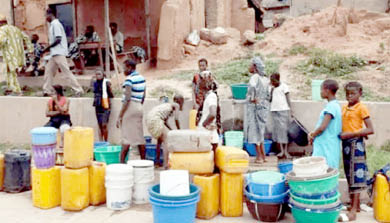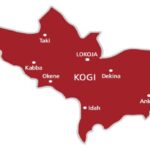Arguably, water, a gift of nature remains an elixir of life. An absence of it makes a living worthless in the ecosystem.
Ironically, the residents of Lokoja, the capital of Kogi State and its metropolis, with a gift of two great rivers; Niger and Benue have been groaning over the scarcity of drinking water for ages, with seemingly no respite insight.
According to Dr Yahaya Abdullai, a retired director in the state public service, it’s ridiculous for the residents of Lokoja with such a natural endowment to continue suffering from scarcity of potable water.
He said it was disheartening to witness people gathering in hundreds to scramble for drinking water at borehole points or locations in Lokoja.
Kogi gov’ship: SDP candidate appeals tribunal judgement
Kogi to recruit 1,050 hunters to curb insecurity
“The ordeal of residents going around in Lokoja with their basins or Jerry cans of different sizes or cars/ vehicles loaded with cans of all sorts, searching for drinking water in different locations in the capital city is better imagined.
“Many had taken such ugly scenarios in Lokoja with a pinch of salt and resigned to fate; as the public water system has virtually collapsed and water taps went dry at various locations for years.
“In its place, shylock borehole operators have taken over, increasing the price per litre of water without due consideration”, said Dr Abdullai.
Amidst these untold hardships, occasioned by the scarcity of water in Lokoja and its metropolis were cases of accidents and incidents of water bone diseases.
Many families reportedly lost their loved ones to accidents while in search of water, and several others had to empty their bank accounts or go out cap in hand begging for assistance to settle hospital bills in such circumstances.
“Recently, a neighbour at Aniebo quarters opposite Gadumo-Lokoja metropolis almost lost his 17-year-old daughter, Jumai, who went in search of drinking water in a neighbourhood. A motorcycle rider, at top speed, hit her while crossing the highway. She spent up to 4months to recover fully from the incident. Such awful stories abound in the city, said Onuh Godwin, a resident of Aniebo quarters.
In the same vein, one Hajia Salimatu Abubakar, a restaurant manager and resident of Adankolo- Lokoja said: “Last year November, a family of seven living at the bank of River Niger at Adankolo-Lokoja almost died of cholera attack for persistently taking untreated (contaminated) River Niger water that is full of impurities.”
Acute water scarcity is a known phenomenon in the areas like Kabawa, Madabo, Lokoja New Layout, Gadumo, as well as Lokogoma, Phase1 and 11, Peace community, and the Ganaja-Lokoja metropolis, as well as Mounti Patti areas in Lokoja, among others.
The relatively rich residents and the faith-based community in Lokoja dig boreholes to service the water needs of their families or interests, while others construct them for commercial purposes, milking residents dry with a high price tag per litre of water intake.
“It’s an ugly scenario that has been staring us in Lokoja, a four-litre jerrycan of water that was being sold between N20 to N50 before, depending on the distance is now attracting N200 in most parts of the city.
“At times, due to the high demand of water from water vendors (Mai ruwa), customers would book down for days before it’s delivered. In most cases, such arrangements would not stand; and we have to close shops for days until we sort it out”, said mama Chioma, an operator of a popular eatery in Lokoja.
A water vendor, Mallam Zubair Rufai attributed the increase in the cost price of a litre of water can to the new fuel pump price regime, stressing that it has affected the source of their water intake.
“Public water source of supply at Lokoja water board has collapsed. We now source our water from private borehole operators that have increased their price per litre. We have no option but to increase ours to meet the cost of water intake at the source”, said Rufai.
At a point, the government, particularly in the early part of this year had to acquire a service of tankers to be distributing water to the areas that are hard hit.
However, several residents appreciated the government’s efforts in this direction but described it as a mere drop of water in the bucket, saying, few residents benefited from the gesture.
“They introduced a tanker water supply system to cushion the effect of potable water scarcity in some areas in Lokoja was short-lived. As it lasted, few streets benefited, and residents of many streets just heard of it. We see the approach as a fire brigade approach with little or no impact on the situation on ground.
“A lasting solution to water scarcity in Lokoja is to put into functioning ‘the Greater Lokoja Water Works’, assembled by ex-Governor Ibrahim Idris’ administration, said to have collapsed and reactivate the two existing water treatment plants”, said Engineer Ahmadu Babajide, who claimed to be part of the team that assembled the Greater Lokoja Water Project Plant.
In his attempt to make drinking water relatively available in Lokoja, the ex-Governor Ibrahim Idris, in partnership with a Chinese investor constructed ‘the Lokoja Greater Water Works’.
The Lokoja water plant, which was situated at the bank of River Niger in the Ganaja-Lokoja area was fitted with the necessary equipment to discharge its function effectively to every part of the city, including adequate funding to ease its operation.
According to Engineer Ahmadu Babajide, who claimed to have played a vital role in the project, no sooner than the water started operation when it ran into the problem of flooding that hampered its effective service delivery.
“Amidst the challenge of water flooding that submerged some vital equipment of the plant and “demobilised” them, the monthly subvention to keep the plant running smoothly was reduced badly by the succeeding administration, coupled with the unnecessary intervention of certain interest groups”, he said.
He added that the two other water treatment plants at Marine Road and Felele-Lokoja are ailing with age, resulting in incessant breakdown, besides being fitted with outdated equipment that has reduced their capacity utilisation to a very low level.
Several residents said even at the peak of its service, ‘the Lokoja Great Water Plant’ could not distribute water smoothly to its beneficiaries as major flow lines and pipes were destroyed during the rehabilitation of major street roads in Lokoja.
According to residents in the Lokogoma-Lokoja area, most of the pipes linking the main flow lines were cut off by heavy-duty machines during the construction of the drainage system and rehabilitation of the Ganaja junction-Army Barrack main driveway from Zone 8 junction in the flank of the city.
“Even before the water works system collapsed, we have not been receiving water in both Lokogoma Phase 1 and 2 in Lokoja. Most of the water pipes attached to the main flow line in our area were destroyed and no replacement despite persistent reporting to the concerned authority”, said Mrs Rabiyetu Jibrin, a resident of the area.
However, the end of water scarcity in Lokoja appears not in sight as the Kogi State government attributed the situation to the global warming phenomenon that occasioned water flooding, leading to the destruction of infrastructure and livelihoods.
The Kogi State Commissioner of Water Resources, Engineer Yahaya Farouk said the consequences of the climate change had rendered the main Lokoja water plant ineffective, disrupting the potable water supply to residents of Lokoja, all this while.
He said the massive flooding in 2022, had damaged major components of the state’s main water treatment plant, built in 2010, with the capacity to produce 15 million gallons of potable water per day.
Engineer Faruk added that the 2022 flood water destroyed six of the eight pumps, with extensive damage to the high leap pump station, chemical room and other vital components of the water treatment facilities.
“The destruction of the water treatment plant by the ‘disastrous floods’ has caused the present persisting water scarcity in the state capital.
“The greater Lokoja Waterworks, with an installed capacity to produce 15 million gallons of potable water per day, was producing 10 million gallons of water to the city of Lokoja, prior to its breakdown”, he said.
The commissioner who said the waterworks require three stages of resuscitation due to the extensive damage to the facility, stressed that the state government has decided to approach the Federal Ministry of Water Resources and Sanitation for intervention, besides considering several other options.
He said relocation of the waterworks to a higher ground, would have been a better option, but that venture may attract the sum of N120b to N150b.
Meanwhile, as an interim measure, he said the old Lokoja Waterworks, with the capacity to produce 200 cubic meters per day is being resuscitated to serve as a backup to ‘Greater Lokoja Waterworks’ during turnaround maintenance.
He assured Lokoja residents that the Old Lokoja Waterworks would be ready to pump an estimated one million gallons of water to Lokoja residents in July, as the present administration is committed to ending the water scarcity.

 Join Daily Trust WhatsApp Community For Quick Access To News and Happenings Around You.
Join Daily Trust WhatsApp Community For Quick Access To News and Happenings Around You.


